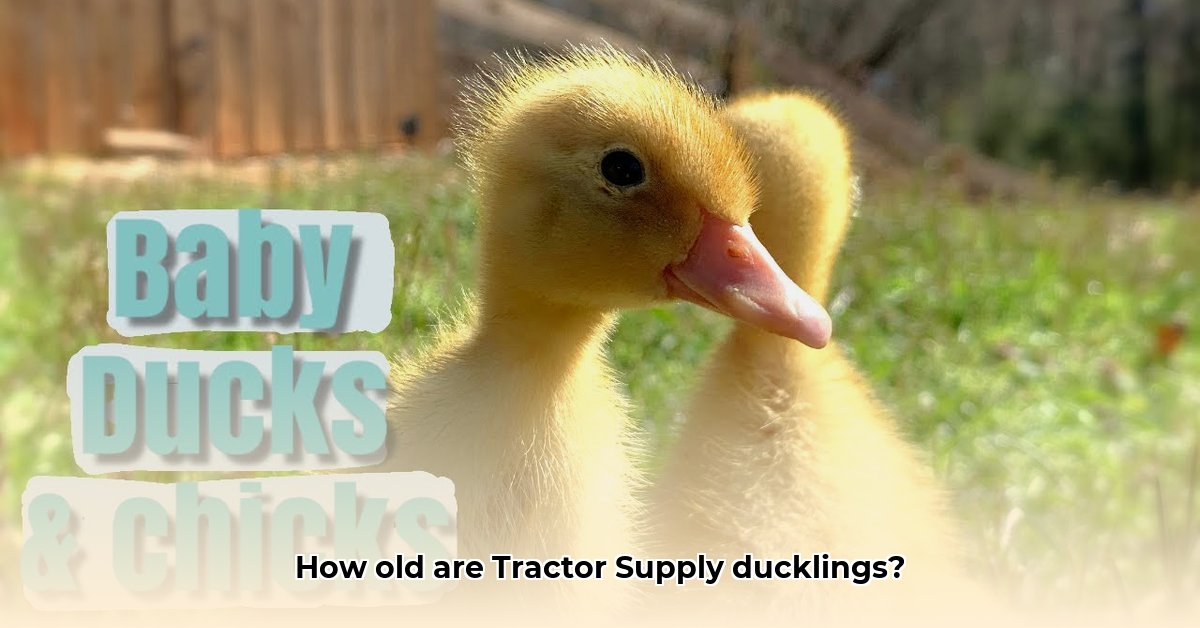
Bringing home adorable ducklings from Tractor Supply Company (TSC) is exciting! But knowing their age can be tricky. This guide provides a clear, concise approach to understanding duckling age at TSC, choosing the right ones for your experience level, and ensuring their healthy development.
How Old Are the Ducklings at Tractor Supply? The Age Factor
Ducklings at TSC typically range from a few days old to nearly a month. This variation stems from several factors: rapid duckling growth, transit time from farm to store, and staggered store shipments. Understanding this age range is vital for selecting appropriate care practices.
Matching Duckling Age to Your Experience Level
Choosing the right age duckling depends heavily on your experience raising waterfowl.
For Beginners: Younger ducklings might seem cheaper, but they require more intensive care. Think of them as duckling babies! Constant supervision, warmth, frequent feeding, and vigilance regarding health are essential.
For Experienced Owners: Older ducklings are often more self-sufficient, though they may cost a bit more. Their advanced development translates to less demanding care.
Regardless of age, always inspect each duckling thoroughly before purchase. Look for bright eyes, clean bottoms, and active behavior. Avoid ducklings that appear lethargic, weak, or unwell. A healthy duckling is key to a successful outcome.
Decoding Duckling Age: Clues and Tips for Determining Age
Precisely determining a duckling's age without a birth certificate is challenging. However, these clues can help you estimate:
- Size: Older ducklings are significantly larger than younger ones. This is perhaps the most obvious indicator.
- Feather Development: Younger ducklings are primarily covered in fluffy down, while older ones display progressively more feathers.
- Activity Level: Healthy ducklings exhibit active, curious behavior, while less active ducklings may be unwell or stressed.
- Breed Variation: Keep in mind that different duck breeds grow at varying rates.
If uncertain, consult a TSC team member; their experience can provide valuable insight.
Caring for Your New Ducklings: A Step-by-Step Guide
Duckling care varies depending on their age. Here's an actionable guide.
Week 1: Newborn Duckling Care (Under One Week Old)
- Warmth: Maintain a temperature around 95°F (35°C) using a heat lamp or brooder. This mimics their natural environment.
- Nutrition: Provide high-quality chick starter feed (a special formula for baby birds) multiple times daily.
- Hydration: Fresh, clean water is crucial. Use shallow waterers to prevent drowning.
- Hygiene: Frequent brooder cleaning is essential for preventing disease.
Weeks 2-4: The Rapid Growth Phase
- Increased Space: As they grow, gradually expand their space, preventing overcrowding.
- Diet Transition: Transition to a grower feed designed for more developed ducklings.
- Continued Hydration: Maintain plenty of clean water; consider automatic waterers for consistent access.
- Controlled Outdoor Exposure: Begin short, supervised outdoor time in a secure enclosure.
- Health Monitoring: Regularly monitor for signs of illness (lethargy, poor appetite, etc.).
Weeks 5-8: Young Adult Stage
- Adult Feed Transition: Shift to a feed formulated for young adult ducks.
- Environmental Enrichment: Provide stimulating elements like pebbles or floating toys.
- Supervised Water Access: Allow supervised access to a pond or safe water source.
- Social Interaction: Ensure ample opportunities for interaction within their flock.
Beyond Eight Weeks: Maturity and Ongoing Care
- Adult Diet: Maintain a balanced diet appropriate for mature ducks.
- Predator Prevention: Implement robust predator protection measures.
- Regular Health Checks: Maintain routine health checks for early detection of any issues.
Remember, this is a general guideline; individual ducklings may have unique needs. Observe your ducklings closely and adapt your care accordingly.
Addressing Common Concerns: Troubleshooting Duckling Care
Inconsistent Age Labeling at TSC: Providing feedback to TSC about any inconsistencies in their age labeling is valuable. This can improve the overall customer experience and help ensure responsible duckling care.
Illness in Ducklings: If your duckling shows signs of illness, seek veterinary attention immediately. Early intervention significantly improves their chances of recovery.
Ethical Sourcing Concerns: Questioning TSC about their duckling suppliers and their practices is vital. Supporting ethical and sustainable farming practices directly impacts animal welfare.
Responsible duck ownership hinges on research and dedication. By following this guide, you can significantly increase the likelihood of raising healthy and happy ducklings from Tractor Supply.